Gandhi’s Grave
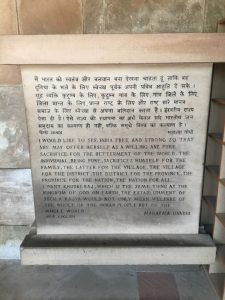 Gandhi Quote. |
Robert, Neha, Michael and I didn’t intend to visit Gandhi’s grave, but on the day we went to visit the Red Fort it was closed, so we went to Gandhi’s grave which is close by.
Gandhi’s grave was probably my favourite and most significant place of all the sites I visited in India, because of the man it commemorates. Gandhi is seen as the Father of the Indian nation. He is on bank notes and deservedly put on a pedestal. I didn’t know much about Gandhi before I went to India. But when I came home and did some research, it resulted in the visit to his grave meaning even more to me.
Gandhi was an inspirational man. As an adult he was civil rights activist that believed in non-violent protest, non-violent civil disobedience, peace, community and was a leader in the Indian Independence Movement. He was known for being spiritual and religiously Hindu. |
Gandhi to me was a enlightened soul, with his common sense ideas being ahead of his time.
One of the things I admire about Gandhi was that as a teenager he experimented with drinking alcohol, eating meat and sex (From: BBC – iWonder, last accessed: Saturday 8th August 2015). This showed to me that Gandhi was on a journey to enlightenment when he was younger. That Gandhi had fundamentally started out as a ordinary human being that went on to become enlightened, using his wisdom and good soul to influence and create some incredible changes in the world. These changes making the world a better place for everyone.
Gandhi apparently predicted his own death, mentioning that he thought he would be assassinated and hoped to be able to forgive the man that did it. Gandhi was on his way to a prayer meeting when he was shot three times in the chest by an extremist. Gandhi who had believed in peace, hope and the best of humanity had been violently murdered. India and the rest of the world mourned his loss.
Apparently some of Gandhi’s ashes are buried in this memorial. Here are some photos of Gandhi’s grave:
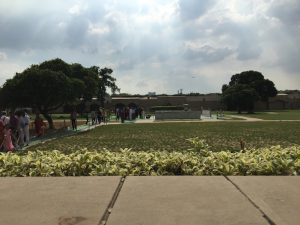 Walk up to Gandhi’s Grave. |
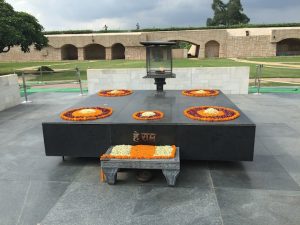 Gandhi’s Grave: Where his ashes are. |
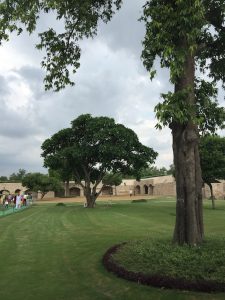 Gandhi’s Grave gardens (1). |
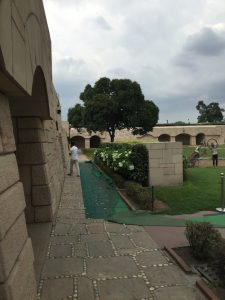 Gandhi’s Grave gardens (2). |
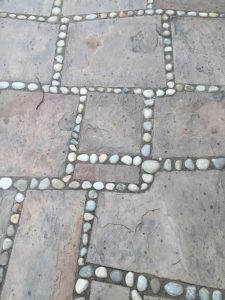 Gandhi’s grave – beautiful tiled flooring. |
One of the most interesting information stones there was Gandhi’s Seven Social Sins (photographed below). Here they are as photo and text:
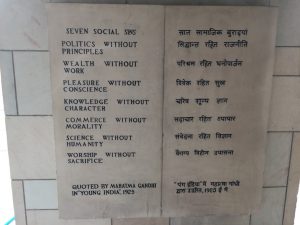 Gandhi’s Seven Social Sins, from ‘Young India’ (1925) |
Seven Social Sins
1. Politics Without Principles
2. Wealth Without Work
3. Pleasure Without Conscience
4. Knowledge Without Character
5. Commerce Without Morality
6. Science Without Humanity
7. Worship Without Sacrifice
(From: ‘Young India’ (1925))
|
Reading this was like seeing a reflection of what’s going on in the world right now. I remember thinking that if Gandhi was around now he’d constantly be leading peaceful protests and marching in them.
India Gate
India Gate is a war memorial to all fallen Indian soldiers. The Gate is ginormous. In the middle of the gate is the monument. It’s a raised platform that has a statue of a black gun with matching soldiers helmet resting on top of it. There’s a flame that is always kept burning and soldiers in ceremonial dress. See photos below:
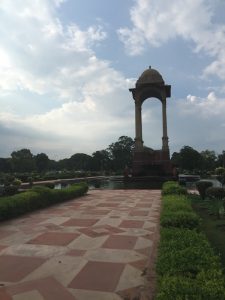 The Empty Canopy |
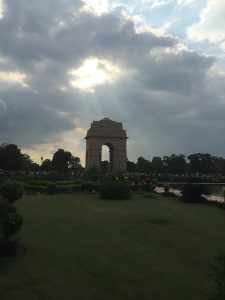 India Gate: A War Memorial (1). |
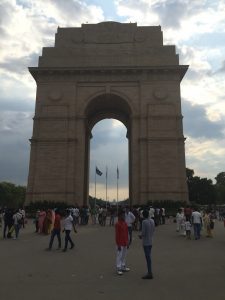 India Gate: A War Memorial (2). |
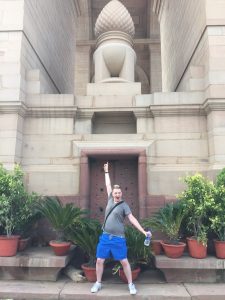 Me pointing out a feature on India Gate. |
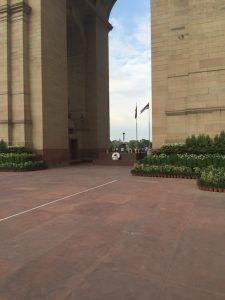 India Gate close up (1). |
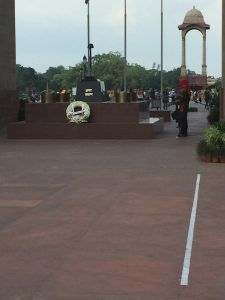 India Gate close up (2). |
The next blog post in this series titled My India Adventure (Part 6) – The Taj Mahal, I will be sharing photos of Taj Mahal’s architectural brilliance. The post will be coming soon, so keep an checking back for updates.
Write soon,
Antony
















